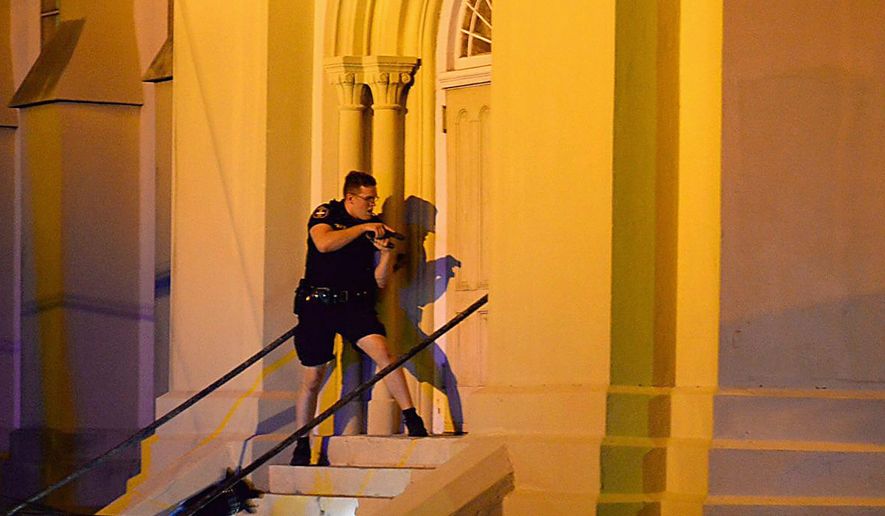He was a young gunman bent on shooting as many worshippers as possible, but Matthew J. Murray never got as far as Dylann Roof, the suspect in Wednesday’s South Carolina church massacre.
Murray had already shot and killed two people in the parking lot when he burst into the New Life Church in Colorado Springs. Before he could pull the trigger again, however, the 24-year-old shooter was gunned down by Jeanne Assam, a volunteer security guard with a concealed-carry permit.
That was eight years ago, but even though Ms. Assam was credited for saving as many as 100 lives that day, a dozen states continue to restrict the carrying of concealed firearms in churches — including South Carolina.
The Emanuel AME Church shooting that left nine dead Wednesday prompted not just a surge in calls from the left for tighter gun-control laws, but also pleas from the right for churches to protect themselves by allowing their parishioners to pack heat.
Kenneth Blackwell, a Second Amendment advocate and former Ohio secretary of state, said houses of worship could take themselves out of the line of fire by taking down the “gun-free zone” signs and letting it be known that law-abiding concealed-carry permit holders — and their guns — are welcome.
“At a time when religion is under attack and we have the government every day running God out of the public square, churches have become the targets of opportunity for deranged people,” Mr. Blackwell said. “Particularly if they assume that folks are not armed.”
PHOTOS: 11 times a good guy with a gun stopped a bad guy, saving lives
South Carolina prohibits concealable weapons in churches, even by those carrying permits, unless “expressed permission is given by the appropriate church official or governing body.” Colorado has no law expressly excluding churches from the boundaries of concealed-carry.
Still unknown is whether the Emanuel AME Church in Charleston allowed concealed-carry, but if the gunman knew that parishioners might be armed, “I doubt that young man would have walked into that church,” Mr. Blackwell said.
Mr. Blackwell’s message was a far cry from that of President Obama, who blamed the tragedy in part on lax firearms laws.
“Communities like this have had to endure tragedies like this too many times,” Mr. Obama said Thursday at the White House. “We don’t have all the facts, but we do know that once again, innocent people were killed in part because someone who wanted to inflict harm had no trouble getting their hands on a gun.”
He added, “Now’s the time for mourning and for healing, but let’s be clear — at some point we as a country will have to reckon with the fact that this type of mass violence does not happen in other advanced countries.”
Erich Pratt, spokesman for the Gun Owners of America, fired off a statement countering the president’s argument by pointing to recent mass shootings in Europe, such as January’s Charlie Hebdo massacre in Paris.
SEE ALSO: Dylann Roof in custody as Charleston church shooting reignites debates over guns, race
Mr. Pratt also said that the Rev. Clementa Pinckney, the Emanuel AME Church’s pastor who died in the shooting, was “an anti-gun activist” who had voted against concealed-carry legislation in his capacity as a Democratic state senator.
“One of the biggest problems at South Carolina church is that the potential victims were disarmed by law,” said Mr. Pratt. “But the president completely misses all of this. He ignores the fact that this was yet another example where a massacre took place in a Gun Free Zone.”
Like public schools and movie theaters, churches have become ripe targets for the deranged because they’re typically gun-free zones — or, as Second Amendment legal expert David Kopel calls them, “pretend gun-free zones,” because there is rarely a security check at the entrances.
Despite its opt-in law on firearms at churches, South Carolina is known for its gun-friendly laws. The state falls under the least restrictive category of concealed-carry permitting, known as “no discretion/shall issue,” which means that the officials issuing the permit must do so if the applicant meets the criteria.
In some states, including California, Connecticut and Massachusetts, law-enforcement authorities have broad discretion to decide which applicants receive concealed-carry permits, according to the Law Center to Prevent Gun Violence.
Mr. Blackwell was quick to defend the rights of churches to decide their own policies on concealed-carry. Even in states whose firearms laws say nothing about churches, privately owned entities have the right to decide whether to allow concealed-carry on their premises, including houses of worship.
“Churches as private property have the right to determine whether or not they want to prohibit or allow concealed carry, and I don’t think there should be any blanket restriction against concealed carry,” Mr. Blackwell said. “If a church community decides against concealed carry, then the individual parishioner can decide whether that’s a deal-breaker.”
Mr. Kopel said that few businesses specifically restrict concealed carry in Colorado, but among those that did was the Century Theater in Aurora, site of the July 2012 shooting that left 12 dead.
“Compounding the problem, Century Theaters did not create an actual ’gun-free zone’ (as some government buildings in Colorado have),” Mr. Kopel said in National Review. “Instead, Century Theaters created a pretend gun-free zone. Century Theaters did nothing to prevent armed criminals from entering the theater.”
• Valerie Richardson can be reached at vrichardson@washingtontimes.com.




Please read our comment policy before commenting.